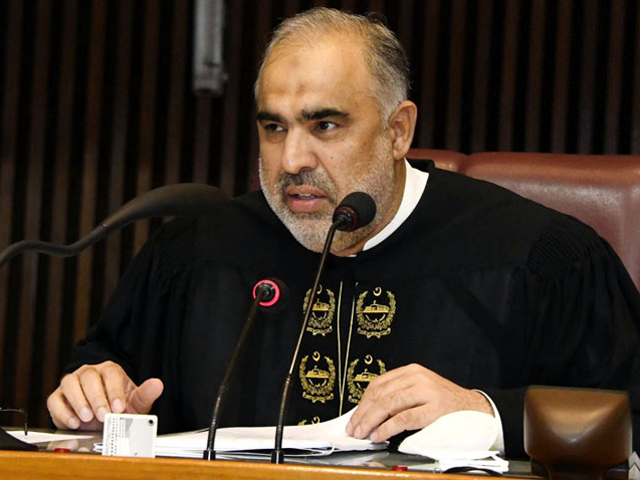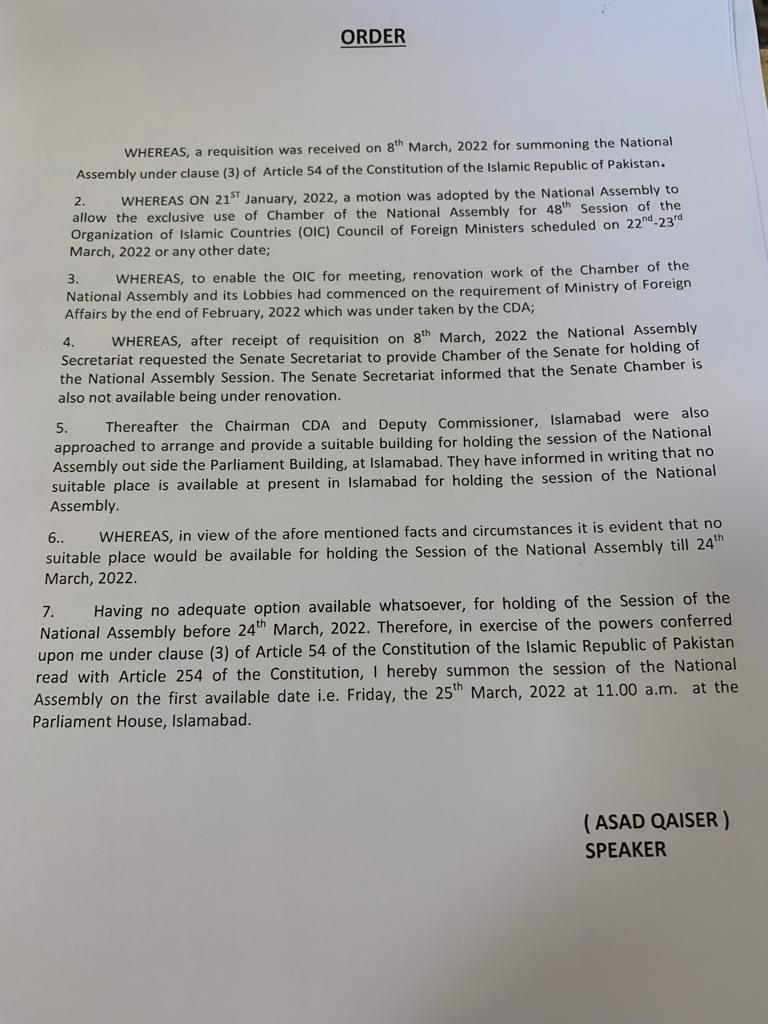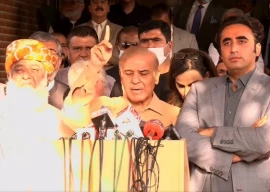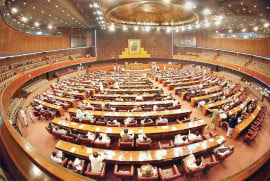
National Assembly Speaker Asad Qaiser has summoned the session of the National Assembly on March 25 at 11 am at the request of the opposition parties who filed a no-confidence motion against Prime Minister Imran Khan on March 8.
The decision to summon the session by the assembly speaker came a day after the joint opposition lashed out at the Pakistan Tehreek-e-Insaf (PTI) government for alleged attempts to delay the crucial session under the guise of the Organisation of Islamic Cooperation (OIC) moot in Islamabad on March 22-23.
The opposition leader and PPP chief Bilawal Bhutto-Zardari had even threatened to disrupt the session by staging a sit-in in front of the assembly. He had warned that if the National Assembly speaker did not allow the tabling of the no-confidence motion on Monday, he would ask his party and the other opposition parties to stage a sit-in in front of the National Assembly.
Read No-trust notice sent to all MNAs
However, the opposition tried to walk back his comments, saying the OIC session in Islamabad was a source of pride for the opposition leadership and it would not do anything to disrupt the moot.
NA session on Friday
In a statement issued by the National Assembly Secretariat on Sunday, the NA speaker summoned the session using powers granted to him under Article 54(3) and Article 254.
In his order, the speaker said that due to renovations at the Parliament House ahead of the OIC moot, no suitable place would be available to hold the session before March 24. “After the receipt of requisition on March 8, the National Assembly Secretariat requested the Senate Secretariat to provide Chamber of the Senate for holding of National Assembly session. The Senate Secretariat informed that the Senate chamber is also not available (for) being under renovation.”
Qaiser further said the CDA chairman and Islamabad deputy commissioner were also approached for an alternate arrangement outside the Parliament House but that also remained an exercise in futility.
“Having no adequate option available whatsoever, for holding of the Session of the National Assembly before March 24….in the exercise of powers conferred upon me under Clause (3) of Article 54 of Constitution of the Islamic Republic of Pakistan read with Article 254…I hereby summon the session…on the first available date i.e. Friday…at the Parliament House, Islamabad,” the order issued by the speaker read.
Article 54
According to Article 54, a session of the National Assembly can be requisitioned if at least 25% of the members sign it, following which the speaker has a maximum of 14 days to summon the session. Once the assembly was in session, the rules say, the secretary will circulate a notice for the no-confidence resolution, which will be moved on the next working day.
Read more Nothing to do with no-trust move: ECP
From the day the resolution is moved, the rules add, it “shall not be voted upon before the expiry of three days, or later than seven days”. Therefore, the experts say, the speaker must call the lower house in session by March 22, while voting on the no-confidence motion must take place between three and seven days after the session is summoned.
‘Arbitrary delay could invoke Article 6’
Meanwhile, Pakistan Peoples Party senior leader Senator Sherry Rehman condemned the delay in summoning the crucial session, saying the NA speaker could not arbitrarily delay the requisitioned session under law.
"If he violates Article 54, which read with Art 95 of the Constitution of Pakistan, enjoins on him the duty of calling such a session within the outer limit of 14 days, he will invoke Article 6 for violation," she said.
According to Article 6 of the Constitution, which deals with high treason, “Any person who abrogates or subverts or suspends or hold in abeyance, or attempts or conspires to abrogate or subvert or suspend or hold in abeyance the Constitution by use of force or show force or by any other unconstitutional means shall be guilty of high treason”.







1725254039-0/Untitled-design-(24)1725254039-0-270x192.webp)
1732189200-0/Express-Tribune-(13)1732189200-0-270x192.webp)



1732186994-0/Untitled-design-(10)1732186994-0-270x192.webp)









COMMENTS
Comments are moderated and generally will be posted if they are on-topic and not abusive.
For more information, please see our Comments FAQ